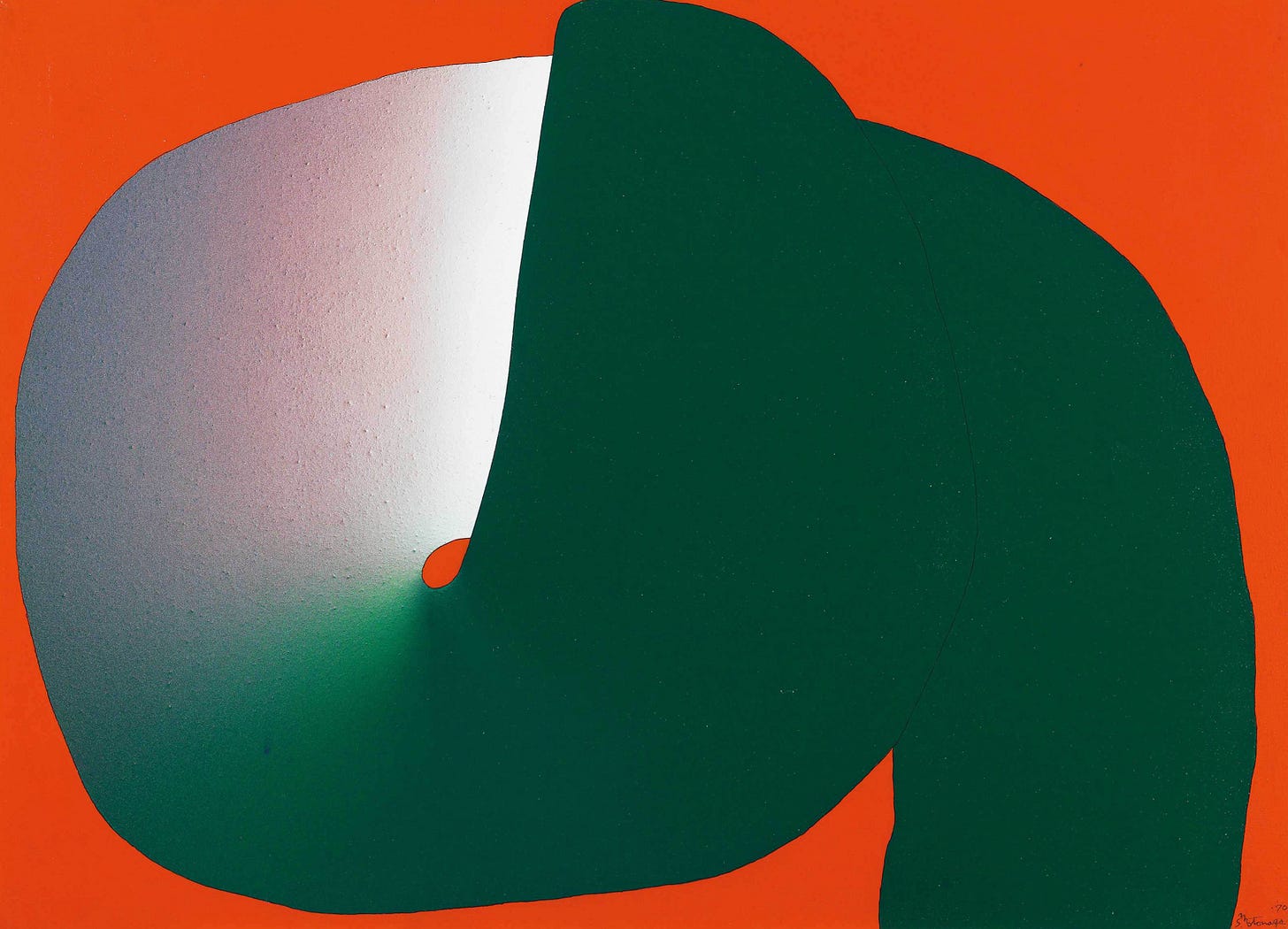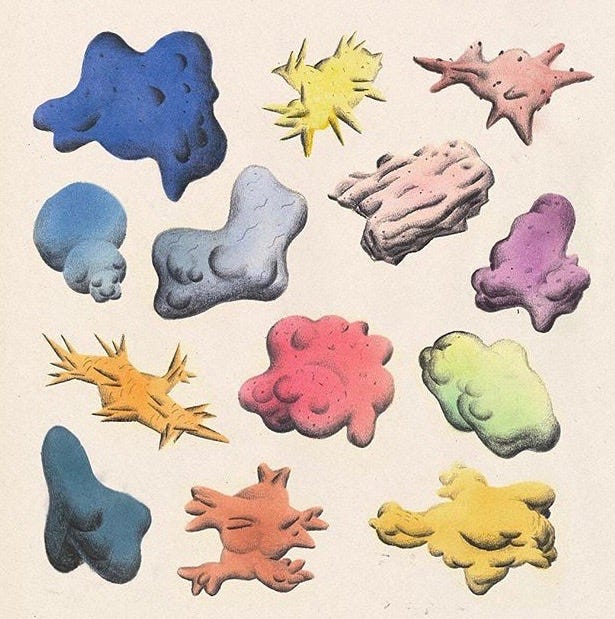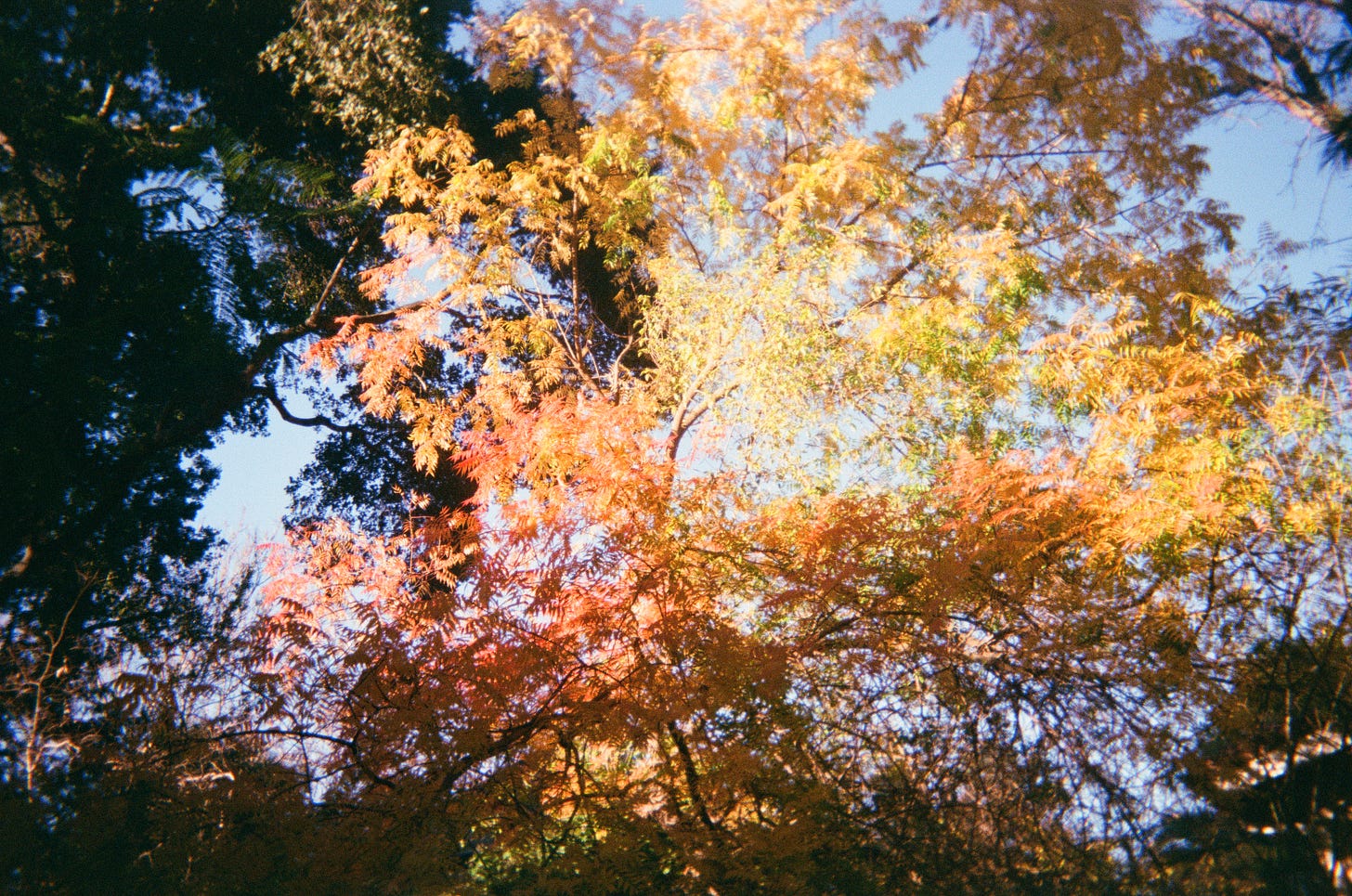I went to go see Michael DeForge last night — the genius Torontonian cartoonist. He was launching his newest daily comic strip book, Birds of Maine, in front of the comic bookstore The Beguiling. Outside, on the sidewalk of College Street and slightly spilling into the parking lane, three rows of black plastic chairs; inside them, what I can only describe as “Toronto comicbook royalty,” which I know is a funny mouthful: Jillian Tamaki; Ginette Lapalme; Patrick Kyle. In between them, strangers arrived in blonde bobs and sleeve tattoos: slim, childish, pink sunglasses at sunset. We crowded around the makeshift stage like a flock of odd-feathered birds, bright and glittering and not quite knowing North.
Michael read three short stories, the panels of them rear-projected onto white film on the store’s windows. The stories were “Soap Opera,” “Library Simulator,” and one more about a mass suicide of electronic devices, beginning with a scene where a cellphone starts to bleed. As he read in his characteristic deadpan, a jazz trio took up in the bar across the street, the mezzo of the vocalist lilting with that specific kind of optimism that is professionally required of bossa nova singers.
Sometime halfway through “Library Simulator,” I began to cry. I had read the story before, online: it was about a videogame called “Library Simulator” in which the nameless protagonist gets to experience what it is like to have a meaningful job. They rearrange the shelves in different ways, direct patrons to the bathroom, send documents to the right printer; at one point, they even begin playing a different videogame inside the simulator itself, a Medieval roaming RPG from their childhood that they find on the shelves of their own library. Over time, they come to befriend the various library regulars; they give and receive book recommendations, even take some of the patrons out for lunch. At a nearby café, Dizzy Owl laments the alienation and hopelessness he feels at his own job. “I want a job that’s just like the job I have now, but more meaningful,” he says. “Like you.”
It’s a tender story, innocent and playful, full of the surreal touches that I’ve come to love about DeForge’s work. But underneath, of course, it is also pulsing with bile: why don’t we have more meaningful jobs? Why is it that — as David Graeber insisted in Bullshit Jobs — we now live in a society in which the uneducated find themselves hamstrung by horrible work conditions, and the educated find themselves in offices, paper-pushing by rote, participating in Byzantine bureaucratic systems that are somehow both opaque and meaningless? The bite of the piece comes at the end, when the protagonist logs off for the night, noting with surprise that they had been playing the game for hours. It’s easy to lose yourself in the game, they explain. Classic DeForge, to make whimsy of doom.
When I remember to do so myself — to make whimsy of doom, that is — I always feel improved by it. But it wasn’t the current of doom that made me cry when I heard “Library Simulator” last night. It was everything else: the balminess of the air, so strangely merciful on the tail-end of our summer heatwaves — the damn black pigeons that kept swooping down in front of the screens, their big wings noisy as engines— the various passerby who ducked with varying shades of embarrassment between us and the store windows, some peeling off to stay, curious how the story would end, curious about Dizzy Owl and his existential malaise, his tears at the checkout counter. We were, somehow, both together and not, and I knew even then that after the questions, the book buying, the book signing and the chitchat, I would walk home, back North along Spadina to the subway, around the bulbous swell of the School of Architecture, alone.

I have always felt things deeply. “Things” as in pieces of art, of life. Dialogue in movies and novels regularly makes me cry, though only if I let it: like allowing the blow of a hammer to ring by lifting your hand from whatever struck thing. There are labels for this kind of condition: INFP, Highly Sensitive Person (HSP), empath, but the labels are no good. At best they allow you to form a mental bubble of permission around yourself as though setting yourself apart, temporarily, from the proper rules of feeling. As in grief, or the ecstasy of a new relationship. As in marriages, or funerals. But always.
It’s a cliché at this point but I did once think of my feelings as a problem. The problem wasn’t that they were painful so much as the fact that they were enormous; even the happy feelings sometimes overwhelmed me, a flood of glittering light in which I’d gasp for breath, speech, self-awareness. I’d take to art to deal with the excess, invent fantastical conditions in which the context merited the deluge. I wrote, in middle school, about demon possessions and sacrifice, about intergalactic wars and internecine betrayals. In between the fighting, there’d be moments of cosmic silence: the glide of translucent dress hems on marble, slow-dancing, kissing with tongue. The lurid colors of life, how brilliant they looked on a background of literal death and destruction! Who could begrudge my protagonists their bliss, their crying when all the known universe seemed to hang in the balance?
I came to understand later that even in art, too much emotion is not a good thing. Quality of the art aside, even personal taste aside, I found that the presence of raw emotion itself sometimes turned people off, as though they were encountering an allergen that they took great care — at all other times, in all other places — to avoid.
I remember, for example, a scene from college, in which I was studying performance art through a class with Aleta Hayes. We were due now to mount a final showcase at the Anderson Collection at the Cantor Art Museum; I had been feeling then for months rather sad and lonely, and had hatched in myself the perfect scheme to flip my heart inside out. The piece was this: called “Long Boat Home,” set on the sidewalk outside the museum, I would have my art partner Sal take a length of metal twine and loop it between myself and a light pole. About a boat’s length. I’d lean back into the twine — bare arms, simple black dress — as she worked, letting it press into my flesh. She’d form a sculpture between us, black and twisting, and fill it with glittering scraps of gold and silver mylar. The piece would be durational, as in: it would take as long as it took. I would not eat, move or drink water. I’d sing a hymn, over and over. Sal would work unsentimentally, in a white industrial jumpsuit, mum as an operative, and when we were done, I’d let the piece stand for a moment before leaning forward and letting the weight of it down. We thought the piece would take maybe 3 hours — and in the end, we were right.
We were not right, though, about the effect of the piece itself. I had thought — between the visual spectacle of this sculpture of wire and the emotional pull of the sad, caught bird I was playing — the piece would exude a centripetal allure. Call it empathy, compassion, whatever: the audience, I thought, would want to luxuriate in the bed of sadness, contemplating the various underlying themes of displacement, dislocation, dysregulation… it’s not that I thought total strangers would break down crying in the street, but I certainly did think they would be absorbed, and allow that absorption to morph into a gentle kind of feeling-with. Instead, they walked by. Piqued by the spectacle, they’d stay long enough to hear a few snippets of song on the wind, long enough to parse the literal materials of the work: wire, industrial gloves, black dress. And then they’d move on, almost eagerly it seemed to me, yearning for the cool of the museum’s interior, the other eccentric dances within.
Later, at a casual reception for the show, my friend S — an older Chinese woman — came up to me with an air of eagerness. It turned out, she was eager to dispense advice. She said,
“You know, in Chinese culture, we say that it is not good for women to be too showy. Do not give away everything, it is best to keep some things under the surface…”
At the time, I smiled back at her as though I understood, and excused myself as soon as I could, citing finger food and the heat. For many months afterwards, however, I felt totally stung by the implication that my art was somehow culturally inappropriate — that in communicating strong emotion, I was failing to enact some central part of my social role as a Chinese woman. Looking back, it was probably one of the worst things a friend could have said to me at the time. Not because it was rude, but because it flew in the face of what I wanted most: for my feelings to be safe inside my art. Where on earth could I put my feelings now?

I did get over what S said, eventually. I did more performance art. I blindfolded myself and typed nonsense into a projector at night; I rubbed my fingers black with charcoal writing over and over snippets of a childhood story. I was able to feel in art, and I eventually came back around to the idea that art itself was capacious, that I could not take responsibility for the feelings of the audience, and that I could only do my work with earnestness, doing my best to be an interesting obstacle in the consciousness of the world. During this period, the pendulum swung back around and I began to feel special for my feelings, as though my sensitivity somehow elevated me above the ordinary, unfeeling masses. I’m sensitive, I told myself, pronouncing the word as though it were a French designation for a special type of person. I’m an aesthete, a poetess! The regular world is just too much for my subtle constitution!
During this time, I would walk in San Francisco and stand in the middle of the sidewalk, staring at a small cluster of cherry blossoms glittering in the wind. If the opportunity presented itself, I might have stalled in traffic, or twirled in a queue. Absorption in the world was my cult drug, and I the eager initiate; at the hem of beauty I threw myself, hoping one day the sobs would end and I would finally be empty: a transparent carapace for the divine. I wanted my feelings to burn off me like the flames in a forge. I wanted my emotions to make me extraordinary.
And of course, they didn’t. (Maybe it’s not “of course,” maybe this isn’t as obvious —) I was different from others in some key ways, but in most other ways, I was exactly the same. To think of emotions as something that I had special rapport with was to deny the many ways in which we each had to carry the burden of being human. It wasn’t that others didn’t feel, it was that others had done something with their feelings that made the rest of their lives functional. In time, I would come to see that I had much to learn from the people around me, as their various stratagems and designs for keeping their emotions in check were in fact the precondition to being socially useful, not just to society at large but in their closest relationships, in their devotions and their commitments: they smoothed themselves out in order to be of use. And I had been, to some degree, a devotee of frills.

At the peak of this period, my partner at the time had it in their mind to leave me. We were living in Paris at the time, I for a research project and they for a friendly visit, and somewhere between Montparnasse and the Parc Monceau it came out that they didn’t see a future between us. I was devastated, and I longed to know why. It took them a very long time — several days, if I recall correctly now — to put it to words. At first they said, “I just feel like we’re going in different directions,” and I wailed, putting to them — quite sensibly, I felt at the time — that that couldn’t possibly be true, as I myself didn’t even know what direction I was going in. In the end, they settled on this:
“You know that feeling that you get, when you look at a piece of art, and you sort of… allow it to change you?”
“Yes,” I said.
They went on, emboldened, “Well, you and I are both committed to letting all of life affect us that way.”
I agreed.
Finally they said, “The difference is… that feeling? I care about whether it is real or not.”
I was so hurt at this time in my life — wandering Paris in the autumn, newly single, hating that Major Lazer song “Lean On” that seemed to play from every open-air café — that it took me many years to hear the truth in what they had said. Emotions, when deeply felt, had an argumentative quality: they made declarations about the world. I feel angry, and so this person must have wronged me; I feel in love, and so this person must be right for me. But emotions do not tell us the truth — they tell us rather who we are, and it is in the difference between the two that the real drama of living resides.
I had, without knowing it, cast my lot with those who were drunk on themselves: eager to feel something, anything, whether that feeling led to the truth of things or merely back to itself. Like pulling one’s fingers over the cloth jacket of a book without ever opening it, I never asked myself what my feelings meant, I merely enjoyed them. For a long time, I was utterly convinced that I could satiate myself moving from texture to texture, feeling things without ever doing anything about it, being moved without moving out of myself. I was wrong.
The Buddhists speak of three poisons that wrack the human mind: anger, greed and delusion. I am a delusional myself, something I come back to every once in a while when I realize I’ve spun myself — again! — into some fantasy, some pleasant reverie of feeling. I don’t hate my feelings, nor do I love them; these days, I use them as clues to read the world around me. I ask: why did I feel that? What does that say? About the world? About myself? About other people, and how they work?
With a gentle harness around my feelings I find I can ride them almost anywhere. And yes, their noses are good.
I don’t think feelings are meant to be felt and merely enjoyed, nor do I think they ought to be ignored entirely, shoved into the figurative basements of our psyches, doomed to a life of obscurity and quiet fire. I think they are the yield of genuine encounters, the way a fruit is the yield of pollination. They tell us things, if we listen. But proper listening is work.
Now, come harvest time, I watch the flowers droop in the garden, the shadows breathing underneath the bent mimosas. I take a moment to admire the slant of the sunshine, the glow of the red globes therein. And then, whenever I can, I put on my gloves. And I try, I really try my best, to work.
Thanks for reading Chasing the Sundog, the newsletter where I try to walk right out of myself and turn back round again. If you liked this post, you might like this essay on the brutal forms of beauty, this essay on queerness and Chineseness, or this essay on feelings, psychoanalysis, Lacan and friendship. As always, here is the complete archive of past essays. Subscribe for free to receive new posts and support the work.







I wish I had read this before writing the newsletter I just published; I would have included an excerpt I'm so compelled by it: "'Well, you and I are both committed to letting all of life affect us that way.' [. . .] Finally they said, 'The difference is… that feeling? I care about whether it is real or not.'” I think what moves me during this phase of heartbreak within a relationship is the nuance and almost imperceptible but monumental difference they are saying to you. I think about my own partner. I think of that feeling of nakedness in the wake of finally understanding such a difference. The feeling of truth above your head. Something about this essay is something I need to hear. I'm grabbing hold onto some larger truth, and those little differences are showing me some larger picture of myself and who I am to others, not just my partner. Thank you, Michelle, as always.
Ok so this video is either wildly funny or inappropriate but.. when you wrote "I found that the presence of raw emotion itself sometimes turned people off, as though they were encountering an allergen that they took great care — at all other times, in all other places — to avoid" this video instantly popped into my mind, with these people as the lead singer in the video:
https://www.youtube.com/watch?v=uiH9GTkcWNI